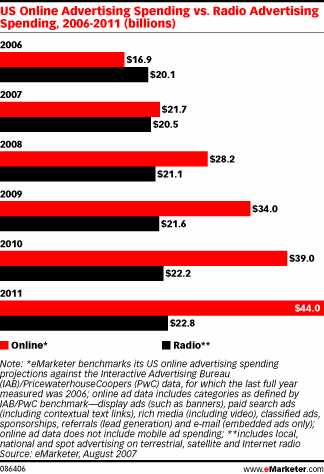«[Internet] Es el medio que más crece en términos publicitarios desde hace años y, a partir de 2008, tiene muchas posibilidades de superar a un clásico como es la radio a escala mundial. La previsión de ZenithOptimedia apunta a que internet acaparará en todo el mundo una inversión de 30.428 millones de euros el año próximo y la radio, 25.786 millones. Ya ha sucedido en países como Reino Unido y, de cumplirse las previsiones, también será en pocos meses una realidad a escala global. Según las estimaciones de ZenithOptimedia, internet se convertirá en el año 2008 en el cuarto medio de comunicación por inversión publicitaria, con 44.583 millones de dólares en todo el mundo (30.428 millones de euros, un 9,4% del total de la tarta publicitaria), por detrás de la televisión (123.079 millones de euros, un 37,9% del total), la prensa (86.927 millones, un 26,8% de la inversión) y las revistas (38.511 millones, el 11,9% del total).Así, el medio online podría superar por primera vez a la radio, que acaparará 37.782 millones de euros (7,9% del total). Por detrás se sitúa el medio exterior, con 18.526 millones (5,7% de la tarta), y el cine, 1,488 millones (0,5%). En España, sin embargo, está lejos de cumplirse estas previsiones, ya que el desarrollo de internet queda aún por detrás de los países más avanzados. El año pasado, internet tuvo una inversión publicitaria de 160,3 millones de euros, apenas un 2,2% del total (7.149,5 millones de euros), según Infoadex. Otros datos que maneja la industria mejoran esta proporción, pero siguen siendo menores: según cifras del sector, internet ya ocupa algo más del 5% del total de la inversión en publicidad española. Ese porcentaje, con todo, queda aún muy por debajo de mercados europeos más avanzados -como Dinamarca, Noruega, Suecia y Reino Unido-, donde la publicidad en la web supera el 15% de la inversión total. Para estos países, las estimaciones son que en 2010 internet concentrará más del 20% de la inversión.»
fonte: «Internet superará en 2008 a la radio como canal publicitario», Cinco Dias, 4/12/07
